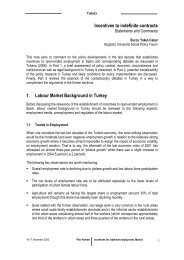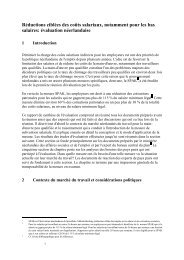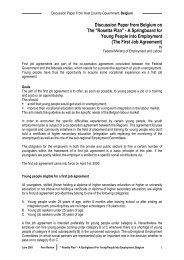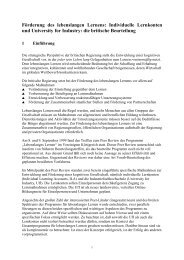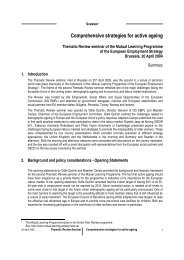Reform of Severance Pay Law in Austria - mutual learning programme
Reform of Severance Pay Law in Austria - mutual learning programme
Reform of Severance Pay Law in Austria - mutual learning programme
Create successful ePaper yourself
Turn your PDF publications into a flip-book with our unique Google optimized e-Paper software.
DISCUSSION PAPER<br />
reduced search <strong>in</strong>tensity without any efficiency costs. Furthermore, Card et al. f<strong>in</strong>d no evidence<br />
for selective fir<strong>in</strong>g prior to the 36-month-cut<strong>of</strong>f.<br />
3.2 The new legislation<br />
In mid-2001, <strong>Austria</strong>'s government announced its <strong>in</strong>tention to reform the country's system <strong>of</strong><br />
statutory severance pay. The aim was to extend entitlement to a wider range <strong>of</strong> situations and to<br />
<strong>in</strong>troduce an option <strong>of</strong> us<strong>in</strong>g payments to fund occupational pensions. However, important details<br />
like required m<strong>in</strong>imum length <strong>of</strong> service for entitlement had been heavily discussed. F<strong>in</strong>ally, the<br />
government decided to delegate the draft<strong>in</strong>g <strong>of</strong> a new severance scheme to the social partners.<br />
In October 2001, the social partners reached a compromise over the severance pay reform. In<br />
June 2002 the new severance pay law was adopted.<br />
The new system (Abfertigung Neu) became effective <strong>in</strong> January 2003. It covers all employment<br />
contracts concluded after December 2002. As regards exist<strong>in</strong>g employment contracts, the<br />
possibility <strong>of</strong> a transfer from the former to the new severance payment law is provided. <strong>Severance</strong><br />
pay claims are shifted to and enforceable by the so-called employee provision funds<br />
(“Mitarbeitervorsorgekassen” <strong>in</strong> the follow<strong>in</strong>g MVK), which are legally <strong>in</strong>dependent from the<br />
employers. The employer is obliged to pay a contribution amount<strong>in</strong>g to 1.53 % <strong>of</strong> gross wages<br />
every month. Accumulated entitlements rest <strong>in</strong> the employee’s account until retirement, unless<br />
the work contract has been term<strong>in</strong>ated by the employer, which makes cash payments admissible.<br />
Employees may draw severance pay only under the same entitlement conditions as under the<br />
previous scheme, and provided money has been paid <strong>in</strong>to the fund for three years. The<br />
contribution periods <strong>of</strong> different employers will be aggregated. Upon becom<strong>in</strong>g eligible for<br />
payment, the employee can choose between cash, further <strong>in</strong>vestment at the same MVK or at the<br />
MVK <strong>of</strong> the new employer, or transferr<strong>in</strong>g the respective amount as a one-time payment to a<br />
pension <strong>in</strong>surance fund. Upon retirement, employees can either claim a cash payment or convert<br />
their entitlements <strong>in</strong>to an annuity. While the former is taxed at a rate <strong>of</strong> 6 %, annuities rema<strong>in</strong><br />
untaxed.<br />
The reform extends the entitlement to severance pay considerably. Entitlement starts after one<br />
month and does not depend on the way <strong>of</strong> term<strong>in</strong>at<strong>in</strong>g the contract and job tenure. Instead <strong>of</strong><br />
los<strong>in</strong>g claim to severance pay <strong>in</strong> case <strong>of</strong> self-term<strong>in</strong>ation, employees can carry over the balance<br />
to the new employment relationship.<br />
30 Nov - 1 Dec 2006 Peer Review <strong>Reform</strong> <strong>of</strong> <strong>Severance</strong> <strong>Pay</strong> <strong>Law</strong>, Vienna<br />
11



